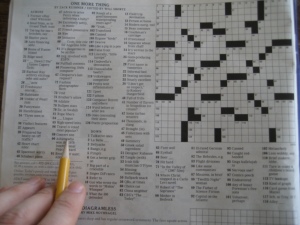
"One More Thing"
by ANDREW ZORNOZA
Last weekend, Zack Kushner climbed the mountain of life and stood at the top. His crossword puzzle, "One More Thing," appeared in the NYT: the Sunday edition. How did he get there? What follows is an interview with Mr. Kushner. . . .
Really a fun puzzle Zack. Are you a cruciverbalist, constructor or other?
Thanks. I'm going to go with cruciverbalist, but they're really the same thing. Cruciverbalist just sounds better at parties. According to the definition, anyone who "enjoys crosswords" is a cruciverbalist, but in its normal usage (as if anyone uses the word normally) it means a constructor of crossword puzzles, or more literally, a "crosser of words."
How does it feel knowing that thousands of people all across the globe are poring over your work?
Odd. To be honest, it hasn't really sunk in yet. It was such a long journey to get this puzzle published that having it actually sitting in front of me in the Sunday Magazine is just, well, odd. Also, being in Australia, most of the reactions are coming from far away. I don't have much chance of seeing someone at the next table working on it. I started constructing with the goal of publishing a Sunday Times crossword, and now I've done it. I suppose I'll have to find a new goal, now. . . .
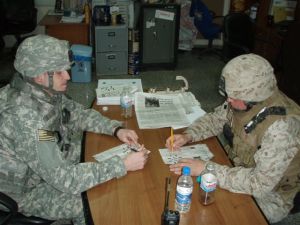
Many writers feel the pull of their profession at a young age. Of course, we all start as readers. How did the transformation from solver to creator happen to you?
With love, of course! I'd been solving puzzles for a long time, but the first puzzle I ever constructed was for my then-girlfriend, now-wife. It was an interesting experience sitting on the other side of the desk, but not one I immediately found addictive. My favorite clue/answer was: "The worst kind of souvenir? / EBOLA". It wasn't until Wordplay came out in '06 that I got it into my head to create a puzzle I could sell. It took me a year of hacking around until I really got the basics of cruciverbalism and another year until I put together a puzzle that met the NY Times standards.
[youtube=http://www.youtube.com/watch?v=pzkBLlw6Azg&feature=related]
Can you give us some idea of your journey to the New York Times?
Outside of the puzzle I just mentioned, my next attempt was pretty ghastly. I tried to do a rebus puzzle using Greek letters. I wasn't quite clear on all the rules of puzzle making and ended up with something that was unprofessional at best. Too many black squares, bad "fill" (the words in the puzzle that aren't theme answers), etc. It was only after I finished it that I saw how unacceptable it was and so I shelved it and started again. My next attempt wasn't as shoddy, a puzzle that included the names of the Rat Pack in the theme answers (i.e. SITS IN A TRANCE). This one I actually sent in, waited a few months, then got the rejection email. In retrospect, my theme answers weren't quality; while SITS IN A TRANCE makes sense, it's not really "in the language." If it's not a recognizable phrase, it won't please editors. FALLS IN A TRANCE, for example, would be better, but still not as good as FALLS INTO A TRANCE. Try doing a Google search of all three terms in quotes and you'll see what I mean. The more hits returned, the more common the phrase, the more "in the language."
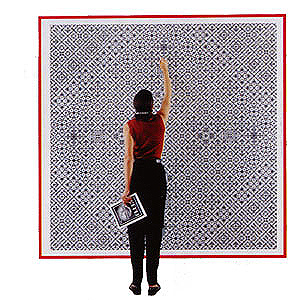
Sometime around this point, I realized I was an idiot for not using the specialized software available to cruciverbalists. Software that helps you create a grid, keep symmetry, clue, and most importantly, fill. I use Crossword Compiler but there are others. I also joined the cruciverb.com mailing list and started to soak up the knowledge.
Two years after first having a real go, I met with success. I've sold three puzzles so far: one to the LA Times, one to Simon & Schuster for Mega Crosswords 8, and this one to the NY Times.I'm securely in the novice-professional category. All are Sunday puzzles, which means they're 21x21 instead of the weekday normal 15x15.
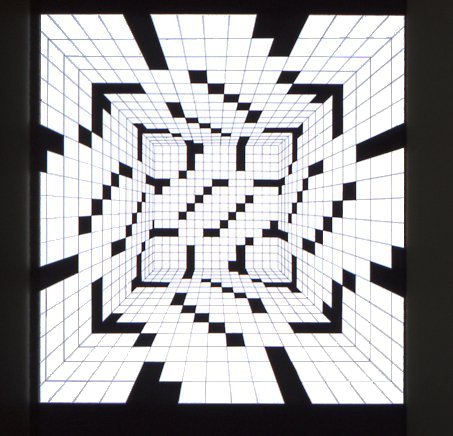
You've mentioned your Grandfather as an early influence. He would certainly be proud.
I used to watch him do the Times puzzles in ink, and that always impressed me. It's hard to imagine how he would have reacted to seeing my puzzle in the Sunday Times. He was a quiet man, not overly affectionate. He probably would have made a few jokes about it, hugged me, and told everyone he met on the street.

How much of a personal expression is a single puzzle? Can you bend the clues to express more than a simple theme? Or does the puzzle have a mind of its own?
The way that a puzzle shows its personality is in the theme answers/clues and in the words you choose for the fill. For example, I liked the word CARJACK and worked to keep that in the fill. Someone else might have liked the name of an opera star or a baseball player. While the clues you choose do reflect your personality, it's important to remember that the editor will change a mess of them. In my NY Times puzzle, the editor changed about half my clues including a bunch of theme clues.

Can you take me through some of these? How about 23 Across: Rachael Ray activity eliciting oohs and aahs?
I got some grief in the crossword puzzle blogs for this clue, even though it wasn't one I wrote. My original clue was "Thrilling grilling?" Apparently people aren't too fond of Rachael Ray, but I've no idea who she is. . . .
30 Across: Pantywaist
WUSS just sort of fit the bill in this corner. My original clue was "97-pound weakling."
45 Across: Spacesuit worry
I liked this one too. Finally one of my original clues! TEAR can mean so many things and cluing a word like that is sometimes dull. You end up choosing between one of 100 standard clues (there's a database of clues that have been published which you can pull from). In this case, I had a bit of brainstorm and found an original way to clue a standard word.
38 Down: "I don't get no respect" to Rodney Dangerfield
A fun answer. A nice Yiddish word to get in the puzzle!

above, the novice-professional Cruciverbalist soaking up the knowledge
Will Shortz has said his favorite crossword clue of all-time is "it might turn into a different story." The answer being "SPIRALSTAIRCASE.” Your favorite all-time clue?
Well, I certainly haven't seen all of them, but one I recall is "Pole vault units" / ZLOTYS. I like the fun wordplay there. It's the same kind of thing I was trying to do with "Ones concealing their aims" / SNIPERS.
[youtube=http://www.youtube.com/watch?v=jWOd3_XfWKo&feature=related]
You live in Australia. I was told that Aussie children wear ice-cream containers on their heads to protect themselves from the attacks of magpies. True?
Hah! I haven't seen that, but I'd believe it. My wife says as a child she used to have to carry an umbrella to protect herself from dive-bombing birds.
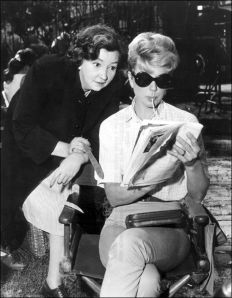
Any taboos in your puzzle making?
Nope. I try to avoid crappy fill, like all cruciverbalists, but constructing a puzzle is very difficult and I've always been stuck with one or two words I wish I could have avoided (like REGRAB, ugh).
Last question. Scrabble. Are you formidable?
It's all relative, I guess. I play a bunch and I'm good, but I'm not competitive and haven't memorized all those weird words one needs to be a true Scrabble ninja.
I prefer to have fun with it.
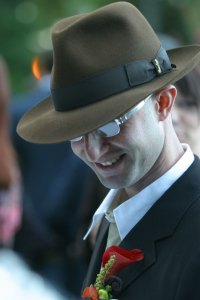
Zack Kushner is a transplanted American in Oz. When he is not creating puzzles for the enjoyment of thousands, he pilots the helm of xZackly Copywriting.

KUSHNER'S PLAYLIST
“Smells Like Content” — The Books (mp3)
“New England” — Jonathan Richman(m4a)
"Take me to the Basement" (mp3)
Andrew Zornoza is the senior contributor to This Recording. He is the author of the photo-novel "Where I Stay," (Tarpaulin Sky Press 2009). His stories have been published in Confrontation, Porcupine Literary Arts, Capgun, SleepingFish and elsewhere, with work forthcoming in Gastronomica and H.O.W. His latest story is available here. You can e-mail him at azornoza at gmail.com. He lives in Carroll Gardens, Brooklyn.

PREVIOUSLY ON THIS RECORDING
Jennifer Beals’ taste in photography.
The web exposes all.
Inability to comment on anything of substance.

John Cage: He said, “I’ve decided to commit suicide.” She said, “I think it’s a good idea. Why don’t you do it?”
Jeff investigates Horace Engdahl and American hegemony
Karen and Tina both wonder what love has to do with it